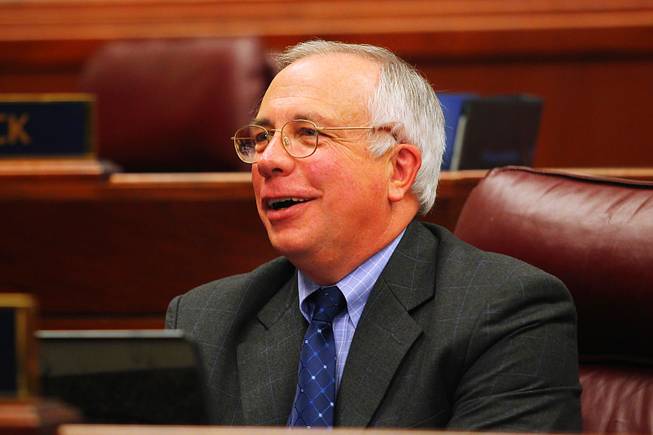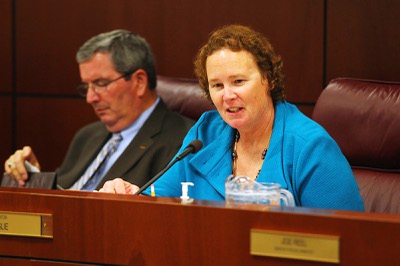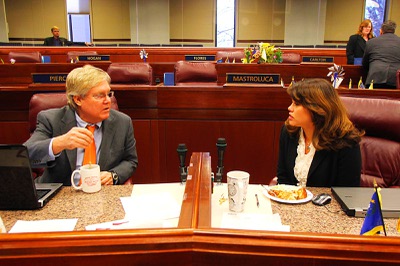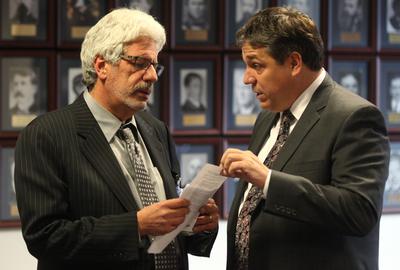
Sam Morris / Las Vegas Sun
Assemblymen Pat Hickey smiles on the third day of the 2011 legislative session Wednesday, February 9, 2011 in Carson City.
Tuesday, May 22, 2012 | 2 a.m.
Sun coverage
When it comes to popular legislative efforts, campaign finance reform is up there with protecting puppies, helping little old ladies cross the street and making cute kids smarter. Just about every sober, on-the-record politician is for it — in concept at least.
So why do efforts to change the system so rarely succeed?
Incumbents like the system as it is — fairly opaque, allowing them to hide much of what happens with their campaign coffers.
And, it’s easy to kill a bill without leaving any fingerprints.
“At the end of the day, you’re asking incumbents to change a process that got them elected,” said Secretary of State Ross Miller, a Democrat.
Assembly Republican leader Pat Hickey, R-Reno, made swings in Carson City and Las Vegas on Monday, touting his ideas to beef up campaign finance reporting requirements.
Flanked by Assembly Republicans and candidates for office, he pitched five bullet points that he said should be a top priority when the Legislature next meets in 2013, including reporting contributions in real time, requiring candidates to report ending fund balances, and reporting trips and gifts from lobbyists and donors when the Legislature is not in session.
But many of the ideas have been proposed before, only to die with little evidence of who did the deed.
While the Legislature passed reform last year that requires electronic filing and allows reports to be searched — what Miller called “the most significant campaign finance reforms passed in state history" — lawmakers shied away from stiffer measures.
Take, for example, a bill last session that would have required lawmakers to report lobbying and gifts outside of the regular legislative sessions. Currently, lobbyists have to report only what they spend on lawmakers during session — 120 days every other year.
That means lobbyists and lawmakers never have to report meals, golf outings and even “fact finding” trips overseas — as some lawmakers took before last session — if they happen during the off season.
Senate Bill 206 — which would have required lobbyists to report expenses regardless of whether the Legislature was in session — passed the state Senate in 2011 unanimously. Then the bill went to the Assembly.
The meeting of the Assembly Committee on Legislative Operations and Elections on May 26, 2011, went like this:
Sen. Sheila Leslie, D-Reno, introduced the bill.
“This bill requires lobbyists to file reports when they lobby us when we are not in session,” Leslie said. “Much of our legislative business is now conducted between sessions, and there are no reporting requirements during that time. This bill is intended to be a sunshine bill.”
Then lawmakers started picking apart the proposed law, never stating opposition outright but not sounding too thrilled with the increased transparency.
Assemblyman Tick Segerblom, chairman of the Committee on Legislative Operations and Elections, asked, “So meetings at Starbucks are now going to be reported?”
Not, Leslie said, if the coffee was under $50.
Assemblyman Pete Goicoechea, R-Eureka, said that lobbyists would turn in their badges to avoid reporting.
“Any rational person is going to turn his badge in so he does not have to file the reports,” he said.
Leslie said those engaged in lobbying outside of session would have two days after lobbying to file as lobbyists.
Assemblyman William Horne, D-Las Vegas, pointed to Clark County Coroner Michael Murphy, who was lobbying for the county.
“If he invites me to his home for dinner, how would we define that dinner?” Horne wondered. “Is he lobbying me because he invited me for dinner? How is he going to report that? Would he be in violation if he does not report it? Where do we draw the lines?”
(Horne also boldly objected to a provision in a separate bill last session that would have required a “cooling off” period before lawmakers lobbied. That proposal died.)
Leslie said, “We are all going to have to adjust. I will have to adjust in my life, too, because I have friends who are lobbyists. It does not mean that you cannot have dinner, but he might have to report it.”
After more questions from lawmakers, some public interest lobbyists spoke in favor of the bill, a step to clean up the reputation of their maligned lobbying profession.
Segerblom then asked, “Is anyone in opposition to the bill?” There was no response.
Despite the lack of stated opposition, Segerblom never brought the bill up for a vote, leaving it to die on his desk.
“People in the system like the system the way it is,” Leslie, the bill’s sponsor, said Monday. “They like the status quo. They don’t see the need to change it.”
She added that, on the Assembly side, neither Republican nor Democratic leadership were helpful in pushing her bill for a vote.
“The animosity toward the bill came from both sides,” she said. “There was equal opportunity hostility to the bill.”
She called Assembly Republicans bringing forward this issue now “a little hypocritical” but said, “I welcome them to the transparency bandwagon.”
Hickey said his proposals, on which he has yet to provide the details, were to stimulate discussion.
He also said the issue should be bipartisan, though he noted that seven Assembly Democrats were also dinged with fines for not reporting expenses, like on out-of-state travel and rent in Carson City, from their campaign funds.
Assemblyman Marcus Conklin, D-Las Vegas, next in line to be Assembly leader but facing a competitive election in his district, said the ideas are not new. (He was also fined $150 for failing to report some expenditures.)
“It should always be a priority for any legislative body to keep and instill a sense of trust with the people it serves,” he said.
But, he added, the Legislature has a lot of issues to deal with, like the budget.
“I recognize the importance of enhancing and building trust," he said. "We do that by solving the real problems facing the state.”




Join the Discussion:
Check this out for a full explanation of our conversion to the LiveFyre commenting system and instructions on how to sign up for an account.
Full comments policy